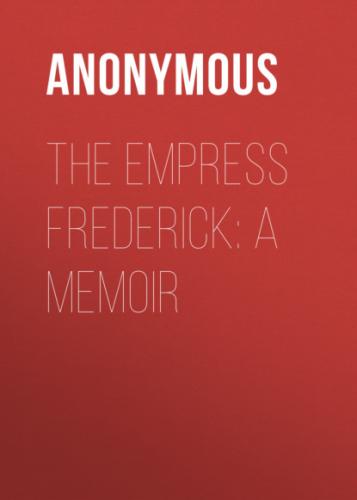Anonymous
The Empress Frederick: a memoir
Published by Good Press, 2021
EAN 4064066139568
Table of Contents
CHAPTER I CHILDHOOD AND GIRLHOOD
CHAPTER III OPINION IN BOTH COUNTRIES
CHAPTER VI BIRTH OF PRINCE WILLIAM
CHAPTER VII ADVICE FROM ENGLAND
CHAPTER VIII DEATH OF THE KING OF PRUSSIA
CHAPTER IX FIRST RELATIONS WITH BISMARCK
CHAPTER X THE WAR OF THE DUCHIES
CHAPTER XI HOME LIFE AND RELIGION
CHAPTER XII THE AUSTRIAN WAR: WORK IN THE HOSPITALS
CHAPTER XIII THE FRANCO-GERMAN WAR
CHAPTER XIV PUBLIC AND PRIVATE ACTIVITIES
CHAPTER XV THE CROWN PRINCE’S REGENCY
CHAPTER XVI SILVER WEDDING: THE CROWN PRINCE’S ILLNESS
CHAPTER XVII THE HUNDRED DAYS’ REIGN
CHAPTER XVIII EARLY WIDOWHOOD: THE FALL OF BISMARCK
CHAPTER XIX THE PLANNING OF FRIEDRICHSHOF: VISIT TO PARIS
CHAPTER XX LIFE AT FRIEDRICHSHOF
PREFACE
MEMOIRS of Royal personages form not the least interesting part of the whole vast field of biography, in spite of the fact that such memoirs differ from the lives of most persons in a private station because of the reticence and discretion which are necessary, especially in regard to affairs of State and political characters. It is often not until a whole generation has passed that it is possible to publish a full biography of a member of a Royal House, and in the meantime the exalted rank of the subject operates both to enhance and to diminish the interest of the memoir.
This is also true in a modified degree of statesmen, of whom full and frank biographies are seldom possible until their political associates and rivals have alike disappeared from the scene. This necessary delay is a test of the subject’s greatness, for it has sometimes happened that by the time a full memoir can be published the public interest in the individual has waned.
By heredity, by training, by all the circumstances of their lives, Royal personages form a caste apart; and though their lot may seem to some persons enviable, it is often not realised how great are the sacrifices of happiness and contentment which they are called upon to make as the inevitable consequence of their exalted position.
The Empress Frederick presents an extraordinary example of what this exalted position may bring in the way of both happiness and suffering. Her life has the added interest that, quite apart from her rank, she possessed an intensely vivid and human personality. History furnishes examples of many Royal personages who have been, so to speak, crushed and stunted in their intellectual and spiritual growth by the restraints of their position.
Not so the subject of this memoir. The Empress was a woman of remarkable moral and intellectual qualities—indeed, it is not difficult to see that, had she been born in a private station, she would have attained certainly distinction, and very possibly eminence, in some branch of art, letters, or science. Her rank, far from crushing and stunting her powers, had the effect of diffusing her intellectual interests over many fields, and perhaps laid her open to the charge of dilettanteism. But such a charge cannot really be maintained in view of the solid constructive work which she achieved, both in the field of philanthropy and in that of the application of art to industry. The exacting mental discipline which she underwent at the hands of her father, though it was in some respects ill-advised as her life turned out, at any rate supplied her with the habit of mental concentration which enabled her to carry out those practical and lasting enterprises with which her name in Germany should ever be associated. Her early training disciplined her eager, natural enthusiasm for all that was good and serviceable to humanity, and directed it especially to the welfare of soldiers and of women and children. She was “a doer of the Word and not a hearer only.” All through her life one is perhaps most profoundly impressed by her inexhaustible energy; her sense of the tremendous importance and interest of life, of the wonders of knowledge, of the delights of art and literature, and of all that there is to do and to feel and to think in the short years that are given us on earth.
One of the greatest dangers to which Royal personages are exposed by the circumstances of their position is that of falling into an attitude of gentle cynicism. Naturally they are often brought into contact with the seamy side of human nature, while at the same time they are not perhaps so well acquainted with its better side, as are persons of less exalted rank. That the cleverer among them should take up an attitude of humorous toleration of the whole human comedy is consequently very natural.
It is no small testimony to the Empress Frederick’s moral greatness that, though she had experiences in plenty of the bad side of human nature, she was never tempted to relapse into such an attitude. No one was ever less of a cynic. She was full of intense passionate enthusiasms and of a profound sympathy for the unfortunate,
